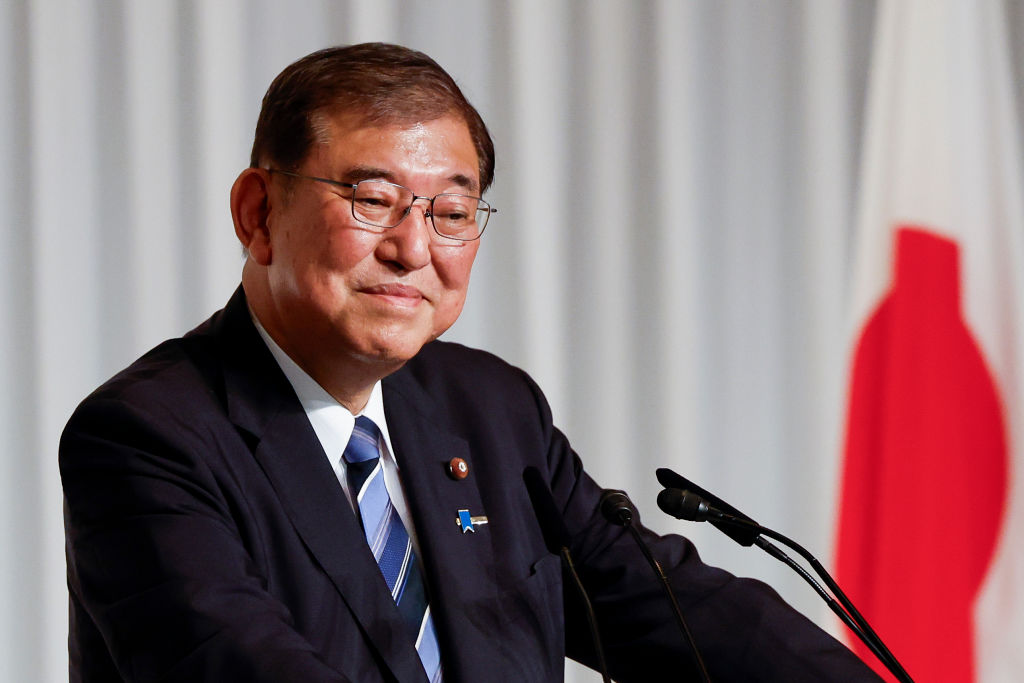Japan’s incoming new prime minister, Shigeru Ishiba, is a 67-year-old former banker who has served as defence minister and has headed up the agriculture department. Having narrowly defeated his Liberal Democratic Party (LDP) colleague Sanae Takaishi in a vote of “law makers” (MPs) in the Japanese Diet today, he will formally take over from Fumio Kishida at the beginning of October.
Excitement here in Tokyo has been restrained, given how often Japan changes leaders without any significant consequences. However, there are reasons to believe that Ishiba, if he can assert himself in the notoriously Machiavellian world of Japanese politics, could be a genuine instigator of change, and that his elevation could have consequences for the region and the wider world.
Perhaps the key area to watch is Ishiba’s defence agenda. During his campaign, his most headline-grabbing policy proposal was for a parallel Asian Nato to be established. He is also apparently open to the idea of Japan developing its own nuclear weapons. Neither of these ideas are feasible in the near term but they do reveal a man who understands that, in a region of increasing threats and global instability, Japan needs to become more capable of mounting its own defence.
The country’s relationship with the US is crucial in this regard. Donald Trump, if he is elected in November, would no doubt approve of Japan doing more for itself. It is hard to see Trump and Ishiba replicating the easy-going “odd couple” friendship the former US president shared with Shinzo Abe, but there does seem to be a basis for a relationship there. However, the knotty issue of Nippon Steel’s proposed takeover of US Steel — which Ishiba supports and Trump opposes — would have to be overcome first.
If Kamala Harris wins, Ishiba will no doubt stress his intention of maintaining Kishida’s fulsome support for Ukraine and increased military spending overall. And as Time magazine points out, he is unlikely to seriously upset the “US-led orthodoxy” in the early part of his premiership. America’s ambassador to Japan, Rahm Emanuel, has warmly welcomed his appointment.
As for the UK, there may be areas for fruitful cooperation. A slightly more self-reliant Japan would surely be open to developing its relationship with a post-Brexit Britain and even reviving the spirit of the successful alliance between the two countries from 1902-22. Whether the more pro-EU Keir Starmer-led government is quite so keen is another matter.
Yet Japan and the UK today face many of the same challenges. One area of mutual concern is the revitalisation of the countryside, which has long been a priority for Ishiba. He represents the struggling Japanese coastal prefecture of Tottori, which has struggled with depopulation and economic decline in recent decades. This is mostly due to rural flight, with the highest percentage of migrants being in the 20-24 age group. Ishiba has vowed to make reviving the regions a priority, with concrete proposals incentivising businesses and entrepreneurs to come to the seemingly moribund ghost towns and cities which proliferate in Japan’s interior.
There is a clear overlap with the UK here, and though the Tories’ “levelling up” label has been rebadged as “securonomics” the basic policy goal of minimising disparities remains the same. If Ishiba can make any progress at all in this extremely difficult policy area, it would make sense for the UK government to pay close attention.
The same can be said for Ishiba’s plans for the economy, given that Japan, like the UK, has colossal public debt. He has also vowed to do more to relieve the financial burden of low-income families by boosting wages and removing consumption tax on certain items.
Through all of this, Ishiba — interestingly — does not appear to be especially ideological. He has maintained a consistent anti-corruption line throughout his career but has frequently changed his mind on policy, such as his turn from championing renewables to backing nuclear.
Whether that was due to admirable flexibility and intellectual honesty, or a lack of firm principles and indecisiveness, could well determine the fate of Ishiba’s premiership. More than that, it could decide his value, as an exemplar, to the rest of Asia and the wider world.











Join the discussion
Join like minded readers that support our journalism by becoming a paid subscriber
To join the discussion in the comments, become a paid subscriber.
Join like minded readers that support our journalism, read unlimited articles and enjoy other subscriber-only benefits.
Subscribe